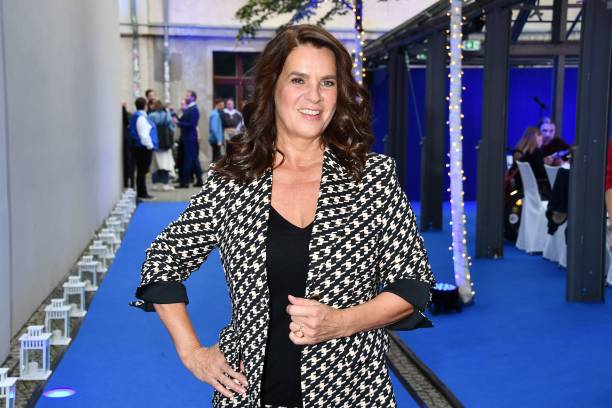Katarina Witt Net Worth: A Skating Legend with a Net Worth of $9 Million
Katarina Witt, the renowned German figure skater and two-time Olympic champion. Katarina Witt net worth is $9 million. Witt’s successful career in figure skating, marked by numerous titles and accolades, significantly contributed to her wealth.
Table of Contents
ToggleBeyond her competitive achievements, Katarina Witt net worth has been bolstered by her ventures in television, modeling, and her involvement in various entertainment projects. Her enduring popularity and marketability continue to secure her financial success long after her skating career.

Katarina Witt, born on December 3, 1965, in Falkensee, East Germany, is a former German figure skater. As a two-time Olympic champion, she is celebrated as one of the finest ladies’ singles figure skaters in history. According to her Laureus profile, she is best remembered for her athletic prowess, charismatic presence, and glamorous image on the ice.
Katarina Witt Net Worth, Salary, and Endorsements
Katarina Witt, renowned as one of the greatest figure skaters of all time, boasts an impressive Katarina Witt net worth of $9 million. With a monthly income exceeding $70,000 and a yearly income surpassing $1 million, Witt has established herself not only in the world of sports but also as a successful media personality and philanthropist.
Katarina Witt net worth is largely attributed to her successful figure skating career, where she achieved numerous titles and accolades. Her athletic success paved the way for lucrative endorsement deals with major brands such as Adidas, Lufthansa Airlines, Volkswagen, Berolina Film-Produktion GmbH, and Deutsche Bank AG. These partnerships significantly contributed to Katarina Witt net worth, making her one of Germany’s wealthiest athletes.
Katarina Witt Net Worth: Philanthropy and Media Ventures
To maintain Katarina Witt net worth, Beyond her athletic achievements, Witt is also known for her philanthropic efforts and media presence. She has served as an ambassador for Special Olympics International and holds honorary doctorates from several universities. Witt’s involvement in various charitable activities and her influential media roles have further solidified her status as a prominent public figure. Through her impressive career and diverse ventures, Katarina Witt continues to inspire and make a significant impact both on and off the ice.
Katarina Witt’s Career and Achievements
Katarina Witt secured her first Olympic gold medal for East Germany at the 1984 Sarajevo Olympics and her second at the 1988 Calgary Olympics. She is one of only two female skaters, alongside Norway’s Sonja Henie, to defend an Olympic title in ladies’ singles figure skating. Witt is also a four-time World Champion (1984, 1985, 1987, 1988) and twice a World silver medalist (1982, 1986). She dominated the European Championships with six consecutive victories from 1983 to 1988, a record matched only by Henie among female skaters. From 1984 to 1988, Witt claimed ten gold medals in eleven major international competitions, establishing herself as one of the most accomplished figure skaters in history.
- Katarina Witt represented the SC Karl-Marx-Stadt Club for East Germany (GDR).
- She started training under coach Jutta Müller in 1977.
- Witt’s rigorous training schedule involved six days a week, with up to seven hours per day, including three hours dedicated to compulsory figures.
- Her first major international competition was the 1979 European Championships, where she finished 14th.
- At the 1981 World Championships, Witt placed 1st in the short program, 3rd in the long program, and 2nd in the combined free skate, but missed a medal due to a low placement in compulsory figures.
- Witt won her first major medals in 1982, securing silver at both the European and World Championships.
- She had a strong chance of winning the 1982 World Championships but made errors in her jumps, which cost her the gold medal. Elaine Zayak won the competition by landing six triples.
- In the following season, Witt won her first European title but finished fourth at the World Championships due to her 8th place in compulsory figures, despite winning the combined free skating.
- Many believed her free skate, which included a triple flip and five triples, was technically superior and deserved 1st place.
- In 1984, Witt was voted “GDR Female Athlete of the Year” by the readers of the East German newspaper Junge Welt.
- She won the 1984 Olympic title in Sarajevo, narrowly defeating Rosalynn Sumners of the United States.
- In the Olympic free skate, which was worth fifty percent of the total score, Witt landed three triple jumps and won by one-tenth of a point.
- Witt became one of the youngest Olympic figure skating champions at 18 years and 77 days old.
- Witt initially planned to continue her career but was uncertain about competing in the 1988 Calgary Olympics.
- Witt successfully defended her World title in 1985. She placed 3rd in compulsory figures behind Kira Ivanova and Tiffany Chin.
- She convincingly won the short program, even against clean performances by Ivanova and Chin.
- In the long program, Witt delivered a four-triple routine, surpassing Ivanova’s strong three-triple performance, winning six judges to three.
- Chin, who could have won, fell on a double axel and failed to complete a triple salchow, earning the bronze medal.
- In 1986, Witt’s dominance was disrupted when she placed second to American Debi Thomas at the World Championships.
- Despite winning the long program and receiving two 6.0s for artistic impression, a mistake in the short program left Witt in 4th place, costing her the gold.
- Considering retirement after the 1986 World Championships, Witt decided to continue competing to reclaim her title.
- Witt won her third World title in 1987. She finished fifth in compulsory figures, which allowed Thomas to retain her title with second-place finishes in the short and long programs.
- Thomas’s 7th place in the short program evened the competition going into the free skate.
- Five skaters, including Witt, Ivanova, Thomas, Elizabeth Manley, and Caryn Kadavy, were strong contenders for the gold.
- Witt, skating last, delivered a performance with five triple jumps, including a crucial clean triple loop.
- Thomas two-footed her triple-loop attempt, and Kadavy, despite two successful triple loops, missed several other jumps.
- Witt earned the best technical and artistic marks of the night, was ranked first by seven out of nine judges, and reclaimed her World title.
- In 1988, Witt won her sixth consecutive European Championship, matching Sonja Henie’s record for the most consecutive titles in ladies’ singles.






